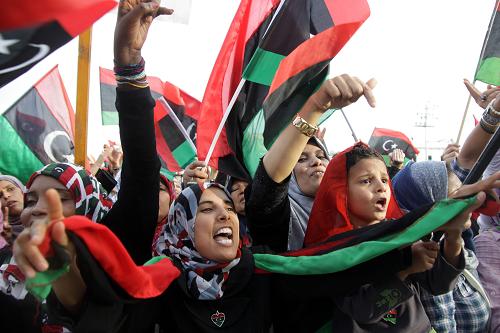Libya begins tough task of forming govt
 0 Comment(s)
0 Comment(s) Print
Print E-mail
China Daily via Agencies, October 25, 2011
E-mail
China Daily via Agencies, October 25, 2011
Libya's new leaders began on Monday the tough task of forging an interim government uniting the nation's disparate political forces after 42 years of Muammar Gaddafi's rule, promising a system of Islamic sharia law.
|
|
|
People celebrate the liberation of Libya at Martyrs' Square in Tripoli Oct. 23, 2011. Vice Chairman of the Libyan National Transitional Council (NTC) Abdel Hafiz Ghoga Sunday officially announced the liberation of Libya from the regime of Muammar Gaddafi at a ceremony being held in Libya's second largest city of Benghazi. [Xinhua] |
"Today, we begin preparing for a new phase ... the phase after the liberation, the phase that we will plan and work hard for the future of Libya," said Abdel Hafiz Ghoga, vice-chairman of the National Transitional Council (NTC).
"Let us start work on the adoption of the constitution," he said late on Sunday as he declared Libya's "liberation" from Gaddafi's rule at a colorful ceremony attended by tens of thousands in the eastern city of Benghazi, where the uprising was launched eight months ago.
EU foreign policy chief Catherine Ashton on Monday said the introduction of sharia law in Libya must respect human rights.
Asked for comment from Ashton on the impact on women of polygamy and a ban on divorce, her spokeswoman Maja Kocijancic said: "We expect the new Libya to be based on respect for human rights and democratic principles."
NTC leader Mustafa Abdel Jalil said: "As an Islamic country, we adopted sharia as the principal law.
"Any law that violates sharia is null and void legally," he said.
Under the NTC's roadmap, an interim government is to be formed within a month and elections for a constituent assembly to draft a new basic law held within eight months.
Parliamentary and presidential elections would be held within a year after that - or within 20 months of Sunday's declaration.
On Monday, Libyans filed past Gaddafi's decomposing body for a fourth day, keen to see for themselves that the fallen leader was dead, while talks dragged on among emerging local factions over disposing of the corpse.
Fighters guarding the darkening body and those of Gaddafi's son Mutassim and his former army chief had placed plastic sheeting under them as fluids leaked into the market cold store in Misrata, where they had been taken after their capture and killing in Gaddafi's hometown of Sirte on Thursday.
With the door constantly opening to allow a procession of onlookers, in a grim parody of the lying in state typically accorded to deceased leaders, the refrigeration unit was failing to prevent a rapid decomposition and guards handed out surgical face masks to visitors to shield them from the stench.
Gaddafi and his son died after being captured, wounded but alive - some of their final moments captured on video.
But few Libyans are troubled about either how they were killed or why they are being kept exposed to public view for so long, something against Islamic tradition which normally dictates burial within a day.
However, some of the anti-Gaddafi rebels' foreign allies have expressed disquiet about the treatment of Gaddafi both after his capture and death.
The burials have been held up by wrangling between the emerging factions within the NTC over where they should be interred.
The NTC wants the bodies buried in a secret location to prevent the grave becoming a shrine for Gaddafi loyalists. But authorities in Misrata, a city whose siege by Gaddafi's forces made it a symbol of the revolt, do not want the body interred there.







Go to Forum >>0 Comment(s)